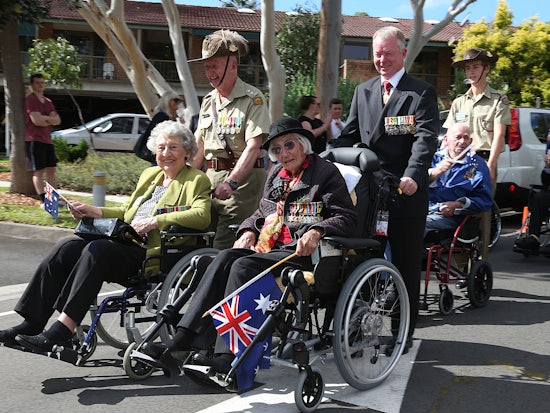New South Wales provider honours women in service this ANZAC day
Choosing a different focus for its ANZAC Day commemorations each year, this year RSL LifeCare in Narrabeen commemorates the service of women who served and died in all wars and conflicts.

RSL LifeCare honours women in service this ANZAC day (Photo: Glenn Nicholls)
In previous years, the focus of ANZAC day commemorations has included Afghanistan and the WWI Centenary.
Women have been involved in every kind of war and conflict, usually as nurses for centuries. The most renowned nurse is from the Crimean War, when British nurse Florence Nightingale introduced basic practices which eventually spread to Australia.
The Australian women became involved in war in 1898 with the formation of the Australian Nursing Service of New South Wales, and later around 60 nurses served in The Boer War. They were scatter throughout South Africa; however, many found themselves tending patients with diseases such as typhoid instead of tending men wounded in battle, because conditions were so unsanitary.
One nurse, Nellie Gould, worked on transforming conditions and raising patient care while statiend at Sterkstroom. When she returned to Sydney, she continued in her work and in WWI, served in Egypt, France and England.
WWI also saw nurses serve in Belguim, Greece, Palestine, Mesopotamia and India. 3,000 Australian civilian nurses volunteered for active service, working in hospitals, on hospital ships and trains, or in casualty clearing stations closer to the front line. Many of these women were decorated, with eight receiving the Military Medal for bravery. Twenty-five died during service.
By the end of the war, having faced the dangers and demands of wartime nursing and taken on new responsibilities and practices, nurses had proved to be essential to military medical service.
In WWII women served in the nursing corps of the three Australian Services. More women also joined the auxiliary services established during the war so men could be released for combat roles. There were many volunteer organisations and a Women’s Land Army to support agricultural production.
Many women held positions which were previously male-only occupations. Members of the AWAS served as mechanics, drivers, cooks, telecommunications officers, typists and dozens of other occupations. Many were attached to the Royal Australian Artillery fixed defence positions – in charge of the radar and searchlights attached to anti-aircraft gun positions.
The AWAS was the only non-medical women’s service to send personnel overseas during the war. 3,477 AANS nurses served and of these 71 never returned.
During the Korean War, women served in BCOF hospitals in Japan with a small number based in Korea. In the Malayan Emergency, 33 nurses were deployed overseas while the Vietnam War involved 43 members of the Royal Australian Army Nursing Corps. Australian women civilians also deployed to Vietnam serving as journalists, entertainers, Red Cross support and civilian medical teams.
In the first and second Gulf conflicts, women were active in service as pilots, medical and support staff on military bases from Saudi Arabia to Afghanistan.
Today, women are on active service in combat areas, including Afghanistan and Iraq. Women ADF members fly, navigate and maintain war plans; they crew ships, including submarines; they make command decisions.











![The new Aged Care Act exposure draft is slated for release in December of 2023, but advocates hope to see it rolled out on January 1, 2024. [Source: Shutterstock]](https://agedcareguide-assets.imgix.net/news/articles/wp/agedcareact__0811.jpg?fm=pjpg&w=520&format=auto&q=65)












Comments